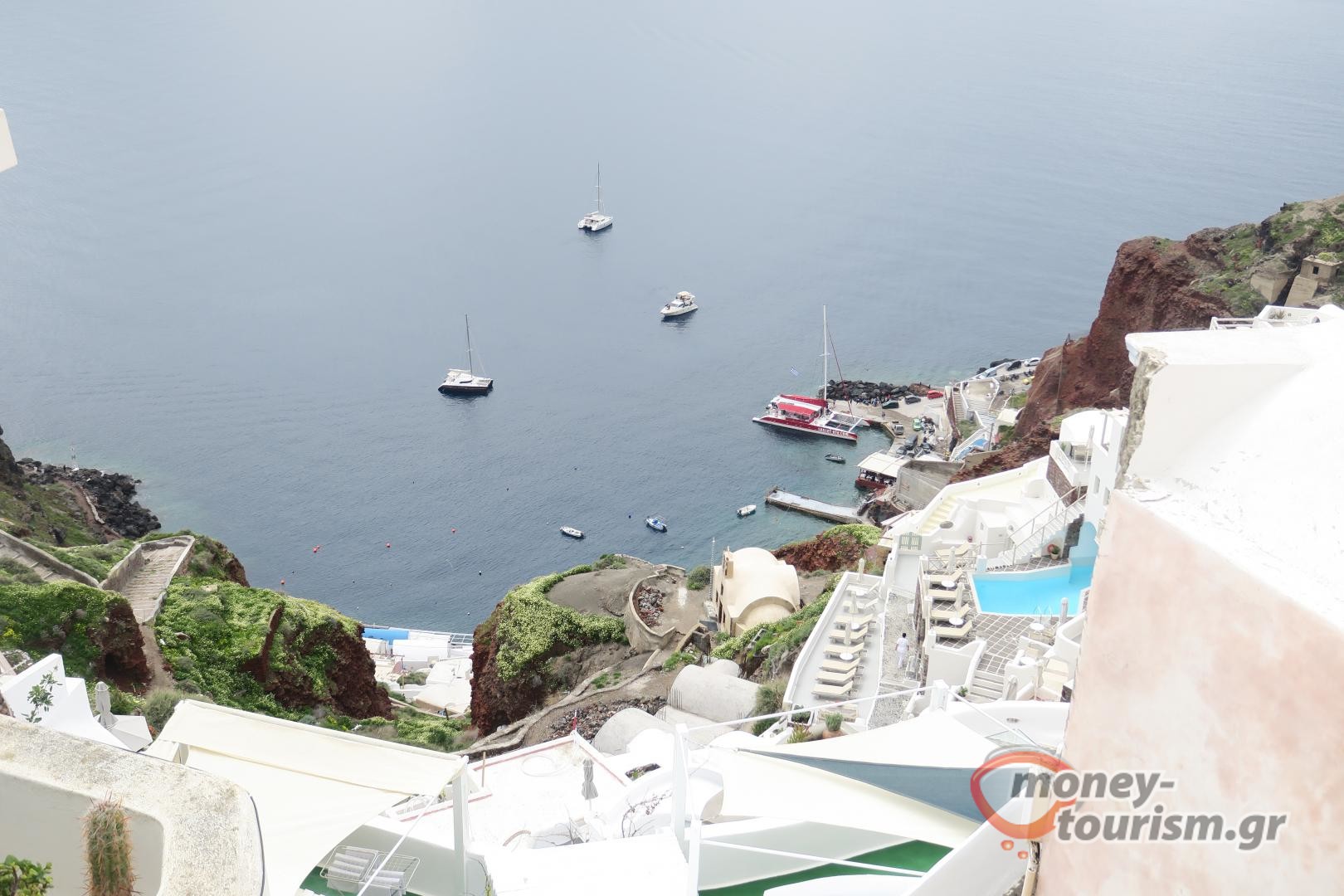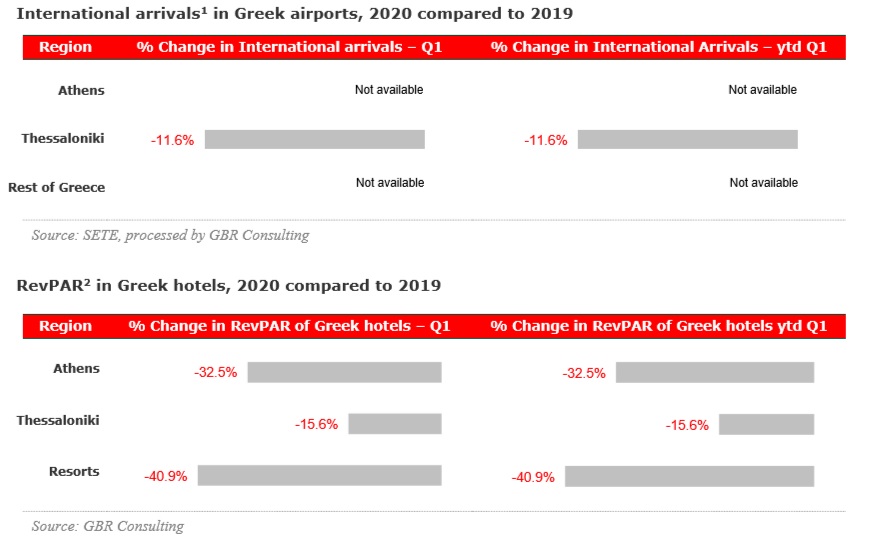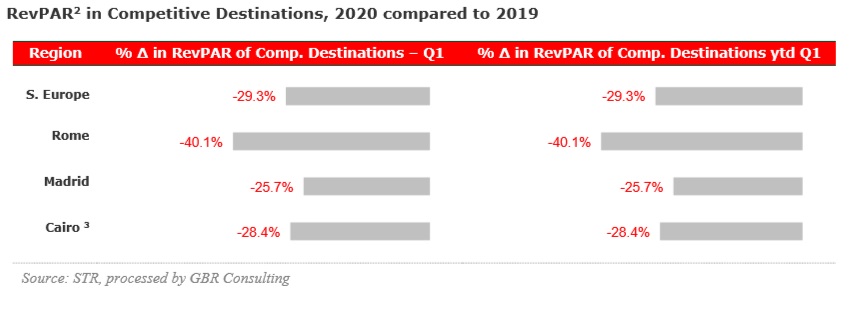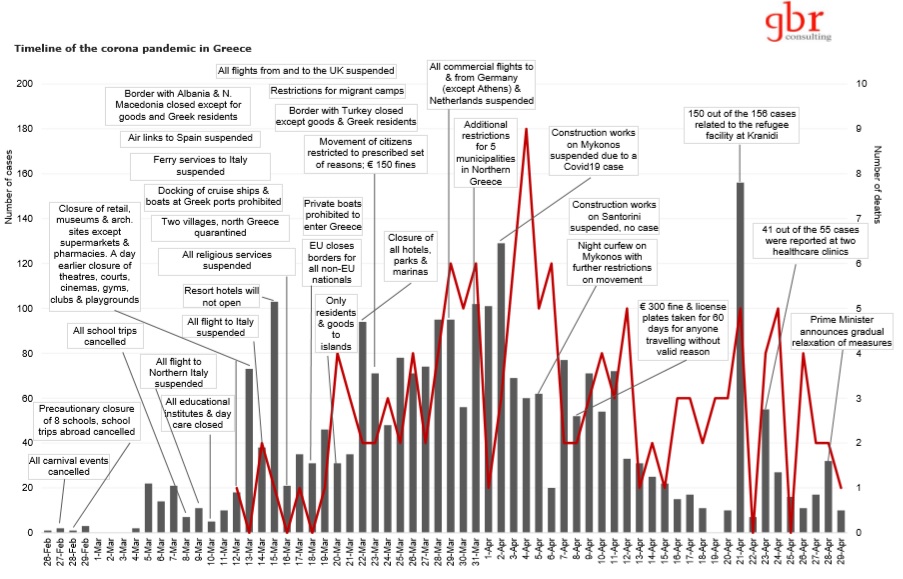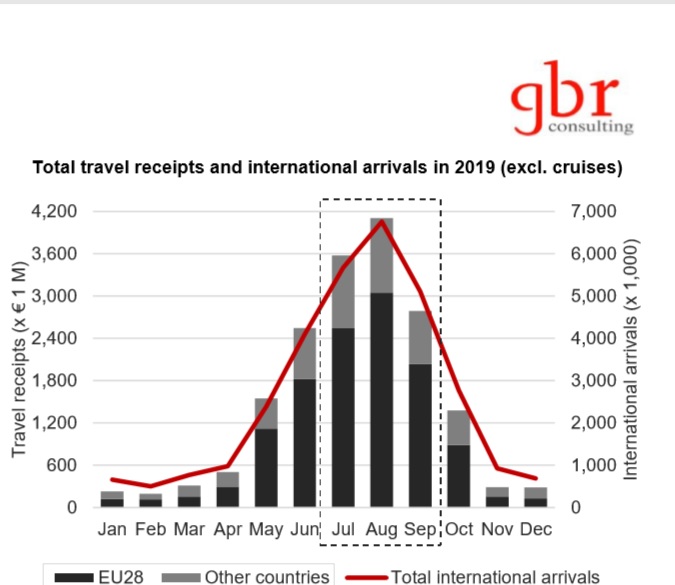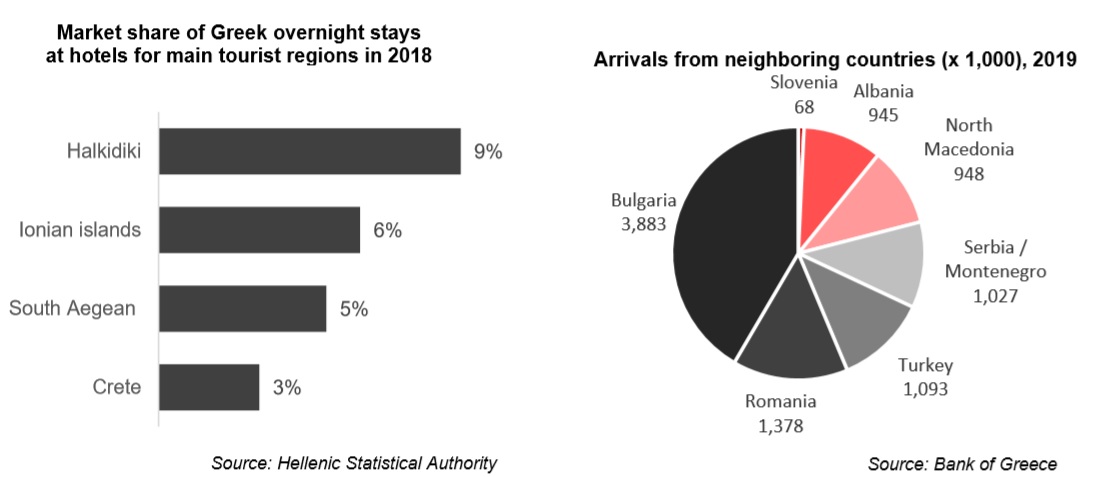GBR’s newsletter provides a snapshot of the performance and outlook of the Greek hotel industry, within the broader context of the international hospitality industry as well as of Greek tourism and Greek socio-economic developments.
- On December 8th, 2019 a patient in the city of Wuhan sought medical help for pneumonia-like symptoms. On December 31st Chinese authorities alerted the World Health Organisation about a string of pneumonialike cases in Wuhan and on January 1st, 2020 the Huanan Seafood Wholesale Market was closed down as it was identified as the center of the outbreak.
- On January 24th, 2020 the first case in Europe was confirmed in the city of Bordeaux, France and Finland, Germany, the United Kingdom and Italy followed with their first cases. On February 11th, 2019 the WHO named the disease COVID-19, short for coronavirus disease 2019. As of 17 March, all countries within Europe had a confirmed case of COVID-19. The first case in Greece was confirmed on February 26th, 2020. A 38-year old woman from Thessaloniki, who had visited Milan in Northern Italy tested positive. The day after the Greek Government cancelled all carnival events in the country followed by a wave of measures leading to a nearly complete lockdown on March 23rd, 2020.
- As per April 29th Greece registered 2,576 persons with Covid19, of whom 139 passed away. Contrary to many other countries, Greece took quick control of the pandemic and was internationally praised for its approach, which we have displayed in the form of a timeline on the next page.
- Demand in the entire tourism sector evaporated at dazzling speed. On March 15th, 2020 it was decided that resort hotels were not allowed to open until the end of April (which was later extended) and on March 19th, 2020 it was ordered that all hotels across the country should close as from March 22nd, 2020. Only 3 hotels in Athens and Thessaloniki and one hotel per regional unit could remain in operation.
- During the three weeks of March, occupancy of the Athenian hotels dropped by 63% y-o-y to a level of around 27%, while in Thessaloniki an occupancy of 24% was recorded, a drop of 62% y-o-y. The few resort hotels in operation during March achieved an occupancy of nearly 22%, representing a drop of 52% y-o-y.
- RevPAR of hotels in Rome declined 40% y-o-y during Q1 2020 recording a single digit number for occupancy in March 2020. In Madrid RevPAR dropped by 26% during the first quarter of this year.
Impact on the economy
- With much of the global economy now in some form of lockdown due to the corona virus pandemic, the world GDP is expected to contract by 7% in H1 2020 in the baseline scenario of Oxford Economics. Activity is expected to rebound sharply in H2, but even so the world GDP is expected to shrink 2.8% in 2020 overall. By comparison, in 2009 the global GDP fall was 1.1%.
- However, if stringent lockdowns or widespread disruption is extended into Q3 2020, perhaps due to renewed outbreaks of the virus, global GDP could fall by as much as 8% this year. Given the deeper contraction, a much weaker bounce back is forecasted. A deeper recession is associated with more lasting risk aversion among households and business.
- Estimates on the effect on the Greek economy are rapidly adjusted. At the beginning of March, the Bank of Greece expected growth to drop to 2%, while on March 20th the baseline scenario of the central bank had been adjusted to zero growth. On April 21st the Central Bank estimated that the economy would shrink by no more than 4%, while their most extreme scenario is based on a recession of max 8%. Most analysts are estimating the impact at between 5% and 10%.
- The Eurogroup granted Greece full fiscal flexibility this year and the European Central Bank decided on March 18th, 2020 to include Greek government bonds in the asset purchase program. Previously Greek bonds had been excluded due to Greece’s non-investment grade credit rating.
- With a contribution of around 21% to the Greek GDP in 2019 offering about 846,200 jobs (22% of total employment), much will depend on the course of the tourism sector, which had been the lifeline of the Greek economy so far.
- In 2019 31.3 million international arrivals were recorded, who spent € 17.7 billion.
- In addition, 2.7 million cruise passengers were registered, spending nearly € 500 million in the country.
- According to plans announced by Prime Minister Mitsotakis on April 28th city hotels could re-open as from June 1st, 2020 while for resort hotels no clear decisions have been made yet.
- During January and February 2020 travel receipts amounted € 527 million, covering nearly 3% of the 2019 total.
- Considering the complexity of restarting international tourism from zero, one understands that the process will be slow and the damage for the Greek economy will be massive.
The 2020 tourist season will be mostly lost
- Governments, virologists and scientists of countries where measures have been somewhat relaxed are increasingly worried on the behaviour of their citizens and the impact. In some countries, like Germany, the infection rate increased again after lockdown measures eased.
- The German Government has extended on April 29th, 2020 its warning against worldwide travel from May 3rd, 2020 to at least June 14th, 2020 to prevent German tourists once again become stranded overseas, avoiding an expensive repatriation process. Tui agreed last month a € 1.8 billion loan commitment from German state lender KfW.
- Tui United Kingdom, the UK’s largest tour operator, announced April 29th, 2020 that all package holidays have been cancelled up to June 11th, 2020. The MICE market (Meetings, Incentives, Conferences and Exhibitions) and the event industry are likely to restart in 2021 and rely for the time being on innovative virtual and hybrid event models.
- As countries are facing a historically large recession, European consumer confidence crashed (-11.1% in April), fuelled by households’ tumbling expectations concerning the general economic situation, but also their own financial situation, while unemployment is expected to increase in the Eurozone from 7.6% in 2019 to 9.3% in 2020 according to Oxford Economics.
- Meanwhile, tourism suppliers from airlines, accommodation units, intermediaries, car rental companies, cruise & ferry boat operators, tours & activities providers as well as the many other suppliers in the value chain who are depending on the tourism sector are struggling, laying off staff, requesting state support and / or are even preparing for bankruptcy.
Recovery
- Recovery can only take place through coordinated action at a European and local level as a form of a public private partnership in combination with massive liquidity measures to keep businesses alive. Private stakeholders should work as partners and not as competitors in this effort.
- On April 27th, 2020 the Croatian Presidency of the Council of the European Union held an informal videoconference with the EU tourism ministers with the presence of the EU commissioner for the Internal Market and the Secretary General of the World Tourism Organisation. It was stressed that tourism should be amongst the main priorities of the EU’s recovery plan and Ministers highlighted the importance of a harmonised solution for refunding travel packages including vouchers and that unprecedented funds are needed. The Ministers of Bulgaria, Cyprus, France, Greece, Malta, Italy, Portugal, Romania and Spain released a declaration before the meeting highlighting the need to establish homogeneous rules to guarantee safe and seamless travel. The recovery must be consistent with the principles of sustainability.
- In this respect we consider that the post-pandemic recovery plan might also include the opportunity to tackle overtourism and further diversify the tourism product. More travellers are realising the fragility of the world we live in. The creation of meaningful travel experiences, the acknowledgement to stand for something and to make a positive and lasting difference in the communities and environments in which companies operate, could determine the future of travel.
Domestic and road tourism
- In many countries the first step of recovery will take place with domestic tourism starting with business travel. However, the Greek domestic leisure market was hit hard during the Greek financial crisis. In 2018 domestic overnight stays at hotels had an overall market share of 15%.
- However, the market share of Greek overnight stays at major tourist destinations is much smaller. Based on 2018 data Crete had a share of 3%, South Aegean (Dodecanese & Cyclades) 5%, Ionian islands 6% and Halkidiki 9%.
- Arrivals from neighbouring countries represented 30% (9.3 million) of all international arrivals in 2019. Most of these tourists travel to Greece by car. Even though this group is often stated as important in the recovery of Greek tourism, the potential will be mostly limited to Northern Greece and the region of Halkidiki in particular.
Operations
- From an operational perspective restarting tourism is very complex. Things will certainly not be the same as before the Corona outbreak. New protocols need to be developed and implemented throughout the customer journey from travelling to the airport in the home country, boarding the plane, being airborne, arrival at the destination airport, transport to the hotel, stay at the hotel and possible trips outside the hotel using all possible means to travelling all the way back home. The potential risks during each step of the holiday are substantial for travellers, locals, employees and businesses.
- So called ‘health passports’ or similar certificates could be introduced and checked before departure, which will not secure though whether travellers will be infected at the destination. Boarding will be done in a controlled and sequenced manner and will take longer. Airlines might be blocking off the middle seat, something that Ryanair refuses, with an unknown effect on prices.
- The distance or touchless economy will impact the guest experience as technology will take over during check-in and check-out, and service with a smile will not be possible wearing face masks. Access to public areas will be controlled and the health of guests and employees will be monitored. Buffets will increase risks (if allowed at all) or buffet items must be ordered from the dinner table.
- Major hospitality brands such as Marriott, Hilton, Accor but also AirBnB are launching new health and safety procedures, something that must be implemented in a coordinated fashion for all hotels. AirBnB requires to leave rooms vacant for 24 hours following guest checkout.
- Even if all new protocols are being implemented and the travel flow could be resumed, there are still many questions left. What will the demand be like? How will liquidity be provided and at what terms? What will happen if a new case is reported within the accommodation (guest or employee)? Who will bear the cost? At what price are packages sold? What will be covered by insurance companies? Will the loss of hotels be less if they remain closed?

